By Leen Randell
Updated: Jul 04, 2024
10 Best Herbal Decoctions For Cough
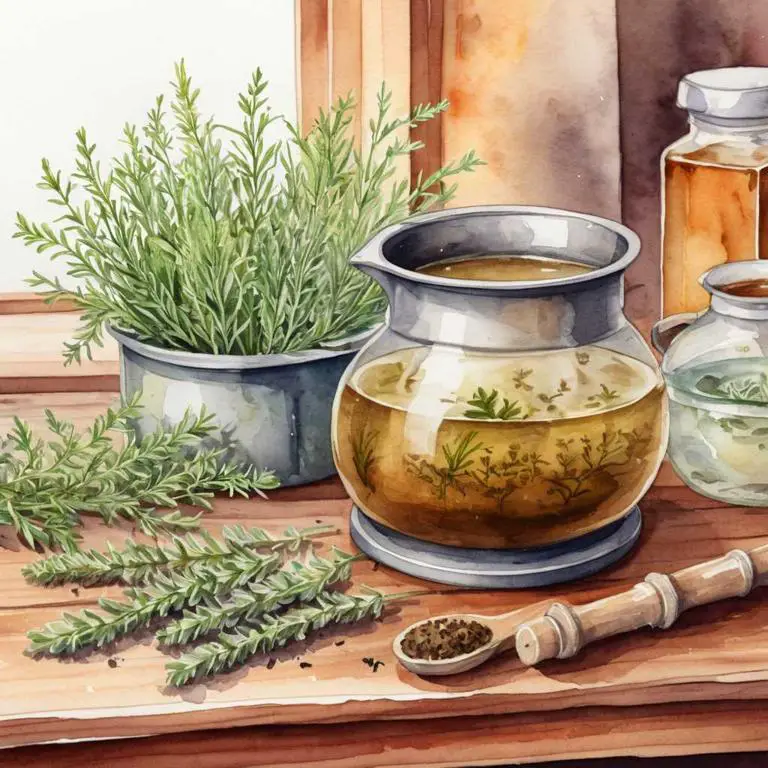
Herbal decoctions for cough are a natural remedy that involves steeping herbs in hot water to create a soothing liquid extract.
These decoctions have been used for centuries to alleviate symptoms of cough, such as congestion and inflammation, by providing expectorant properties that help loosen mucus and reduce coughing fits. Examples include elderberry, ginger, and thyme decoctions, which can be consumed warm or sweetened with honey.
By using herbal decoctions, people can find relief from chronic coughs, sleep better, and enjoy improved overall health, leading to a significant improvement in their daily lives.
The following article describes in detail the most important decoctions for cough, including medicinal properties, parts of herbs to use, and recipes for preparations.
- 1. Glycyrrhiza glabra
- 2. Gelsemium sempervirens
- 3. Sambucus nigra
- 4. Echinacea purpurea
- 5. Thymus vulgaris
- 6. Mentha x piperita
- 7. Foeniculum vulgare
- 8. Trichosanthes kirilowii
- 9. Scutellaria lateriflora
- 10. Verbascum thapsus
- What is the best combination of herbal decoctions to use for cough?
- What ailments similar to cough are treated with herbal decoctions?
1. Glycyrrhiza glabra
Licorice decoctions helps with cough because of its anti-inflammatory properties, which soothe irritated mucous membranes in the throat and lungs.
The glycyrrhizin present in licorice root has been shown to reduce inflammation and congestion, making it easier to expel phlegm and mucus from the body.
Additionally, licorice decoctions have natural expectorant properties, helping to loosen and clear out stubborn coughs and bronchitis, providing relief from constant hacking and discomfort.

Medicinal Constituents
The list below shows the primary medicinal constituents in Glycyrrhiza glabra decoctions that help with cough.
- Glycyrrhizin: This triterpenoid saponin helps with cough by reducing inflammation in the airways, soothing irritated tissues, and decreasing the production of mucus.
- Flavonoids: These phenolic compounds possess anti-inflammatory and expectorant properties, which help to relieve cough by reducing inflammation in the respiratory tract and facilitating the removal of mucus from the airways.
- Coumarins: These phenolic compounds exhibit anti-inflammatory and antitussive (cough-suppressing) properties, which help to alleviate cough by reducing the spasmodic contractions of the bronchial muscles and decreasing the production of mucus in the airways.
Parts Used
The list below shows the primary parts of licorice used to make decoctions for cough.
- Roots: They contain glycyrrhizin, a sweet compound that helps soothe and calm coughs.
- Leaves: They are used in traditional medicine to treat various respiratory issues, including coughs, due to their expectorant properties.
- Barks: The barks are used to make decoctions that help relieve coughs and sore throats, possibly due to their anti-inflammatory and soothing properties.
Quick Recipe
The following recipe gives a procedure to make a basic licorice for cough.
- Harvest 50-100 grams of glycyrrhiza glabra roots from a trusted supplier or in a controlled environment.
- Clean the roots thoroughly with cold running water to remove any dirt or debris.
- Chop the roots into smaller pieces and then dry them in a low-temperature oven at 150 degrees fahrenheit for 2 hours to remove excess moisture.
- Combine 10 grams of the dried roots with 1 liter of boiling water in a saucepan and steep for 10-15 minutes to release the active compounds.
- Strain the decoction through a cheesecloth or a fine-mesh sieve into a clean container and discard the solids.
2. Gelsemium sempervirens
Yellow jessamine decoctions helps with cough because it has natural expectorant properties that help to loosen and clear mucus from the airways, making it easier to expel.
The decoction's antispasmodic effects also help to relax the bronchial muscles, reducing coughing spasms and providing relief from congestion and discomfort.
Additionally, its anti-inflammatory properties may help to soothe the mucous membranes, further reducing inflammation and irritation that can exacerbate a persistent cough.
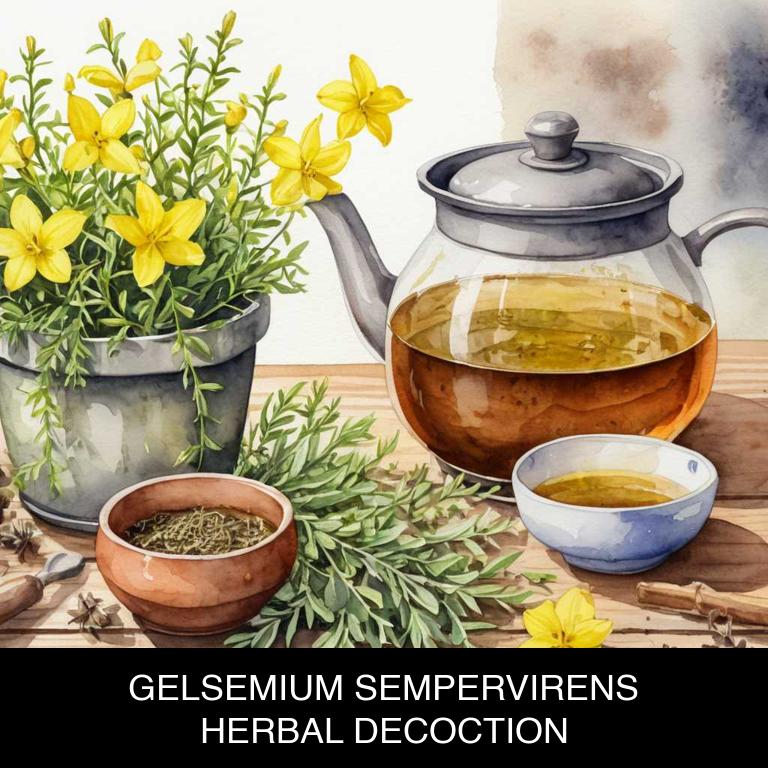
Medicinal Constituents
The list below shows the primary medicinal constituents in Gelsemium sempervirens decoctions that help with cough.
- Gelsemine: This alkaloid has been reported to have anti-inflammatory properties, which can help reduce inflammation in the respiratory tract and alleviate cough symptoms.
- Gelsemidine: Similar to gelsemine, gelsemidine is also an alkaloid with anti-inflammatory properties, which can help soothe and calm the respiratory tract, making it easier to breathe and reducing cough severity.
- Triterpenoids: These compounds have been found to have expectorant properties, helping to loosen and clear mucus from the airways, making it easier to cough up and alleviate congestion.
Parts Used
The list below shows the primary parts of yellow jessamine used to make decoctions for cough.
- Roots: They are used to make decoctions for cough due to their high concentration of bioactive compounds that have expectorant and anti-inflammatory properties.
- Leaves: They are used to make decoctions for cough due to their ability to relieve respiratory symptoms and reduce inflammation in the throat.
- Stems: They are used to make decoctions for cough due to their content of saponins, which help to break down mucus and reduce coughing.
Quick Recipe
The following recipe gives a procedure to make a basic yellow jessamine for cough.
- Crush 30-60 grams of dried gelsemium sempervirens roots into a fine powder to enhance extraction.
- Combine the gelsemium powder with 1 liter of pure water in a saucepan to create decoction base.
- Bring the decoction base to a boil then reduce heat and simmer for 30-40 minutes slowly.
- Strain the decoction through a cheesecloth or fine mesh into a separate container to remove solids.
- Store the herbal decoction in a glass container in the refrigerator for up to 3 days safely.
3. Sambucus nigra
Elder decoctions helps with cough because of its natural expectorant properties, which loosen and clear out mucus from the airways.
The antiviral and anti-inflammatory compounds in elder flowers help to soothe a sore throat and reduce congestion, making it easier to breathe and cough up excess mucus.
Additionally, elder's antimicrobial properties can help combat infections that cause coughs, providing relief and promoting overall respiratory health.
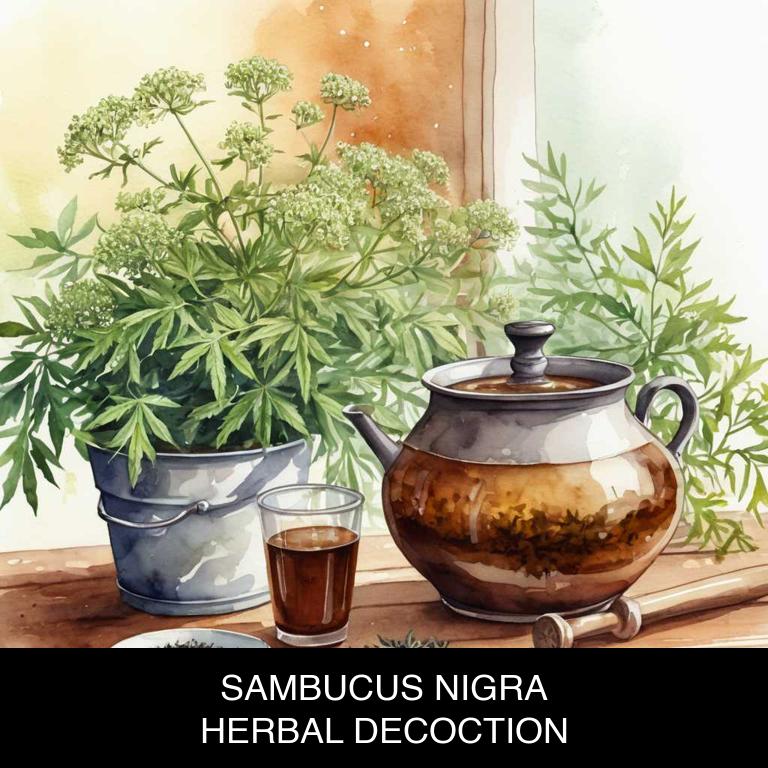
Medicinal Constituents
The list below shows the primary medicinal constituents in Sambucus nigra decoctions that help with cough.
- Isovitexin: This flavonoid glycoside has anti-inflammatory and antiviral properties, which help to reduce the severity and duration of coughing by alleviating the underlying viral or inflammatory causes.
- Sambunigrin: This glycoside has expectorant properties, which help to thin and loosen mucus, making it easier to cough up and relieve congestion.
- Viburnic acid: This phenolic compound has anti-inflammatory and antiviral properties, which help to reduce the severity of coughing by alleviating the underlying inflammation and viral causes.
Parts Used
The list below shows the primary parts of elder used to make decoctions for cough.
- Flowers: Used to make decoctions for cough due to their antitussive and anti-inflammatory properties.
- Leaves: Used to make decoctions for cough due to their expectorant and antiseptic properties.
- Roots: Used to make decoctions for cough due to their antitussive and antiviral properties.
Quick Recipe
The following recipe gives a procedure to make a basic elder for cough.
- Harvest sambucus nigra berries in late summer or early fall when they are fully ripe.
- Crush 20-30 grams of the berries into a fine pulp using a mortar and pestle.
- Combine the crushed berry pulp with 1 liter of boiling water in a saucepan.
- Simmer the mixture for 10-15 minutes to release the active compounds and flavors.
- Strain the decoction through a cheesecloth or a fine-mesh sieve into a clean container.
4. Echinacea purpurea
Purple coneflower decoctions helps with cough because it contains potent compounds like triterpenoids, which have natural anti-inflammatory properties that help to soothe and calm irritated airways.
The decoction's antiviral and antimicrobial properties also help to combat the underlying infection or inflammation causing the cough.
Additionally, its expectorant action helps to loosen and clear mucus from the lungs, providing relief from congestion and coughing fits.
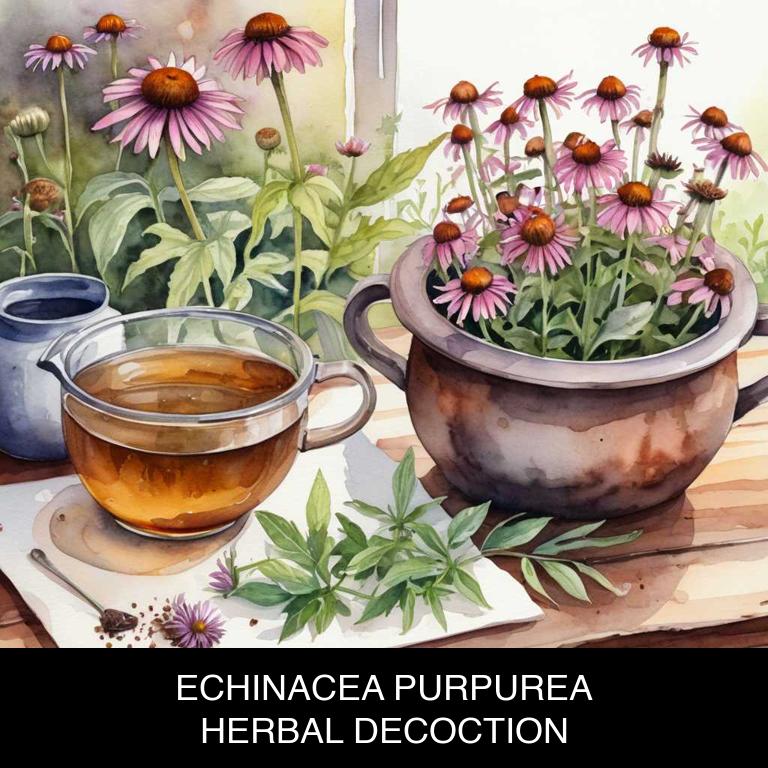
Medicinal Constituents
The list below shows the primary medicinal constituents in Echinacea purpurea decoctions that help with cough.
- Iridoid glycosides: These compounds have anti-inflammatory properties, which help reduce inflammation in the respiratory tract and alleviate cough symptoms.
- Polyphenols: The antioxidant properties of polyphenols help protect the body from oxidative stress, which can contribute to coughing, and also have antimicrobial properties to combat infections that cause cough.
- Caffeic acid: As a phenolic compound, caffeic acid has anti-inflammatory and antioxidant properties that help soothe the respiratory tract and reduce the severity of cough symptoms.
Parts Used
The list below shows the primary parts of purple coneflower used to make decoctions for cough.
- Roots: Echinacea purpurea roots are commonly used for decoctions due to their high concentration of alkaloids, which are believed to have anti-inflammatory properties.
- Flowers: Echinacea purpurea flowers are often used for decoctions because of their rich content of flavonoids and phenolic acids, which are thought to have antioxidant properties.
- Leaves: Echinacea purpurea leaves are sometimes used for decoctions due to their ability to release volatile oils, which can help to soothe a cough.
Quick Recipe
The following recipe gives a procedure to make a basic purple coneflower for cough.
- Harvest echinacea purpurea roots and flowers in late summer or early fall when flowers have turned purple.
- Clean and dry the echinacea roots and flowers thoroughly to prevent contamination and decay.
- Chop the dried echinacea roots and flowers into smaller pieces to increase their surface area.
- Steep 1-2 teaspoons of the chopped echinacea in 1 cup of boiling water for 5-10 minutes.
- Strain the decoction through a cheesecloth or fine-mesh sieve into a clean container to remove solids.
5. Thymus vulgaris
Thyme decoctions helps with cough because it contains thymol, a potent expectorant that loosens and clears mucus from the lungs.
The warm, soothing properties of the decoction also ease congestion and reduce inflammation in the throat and chest, providing fast relief from persistent coughing.
Additionally, thyme's antimicrobial properties help combat underlying infections that may be contributing to the cough, promoting a faster recovery and alleviating discomfort.
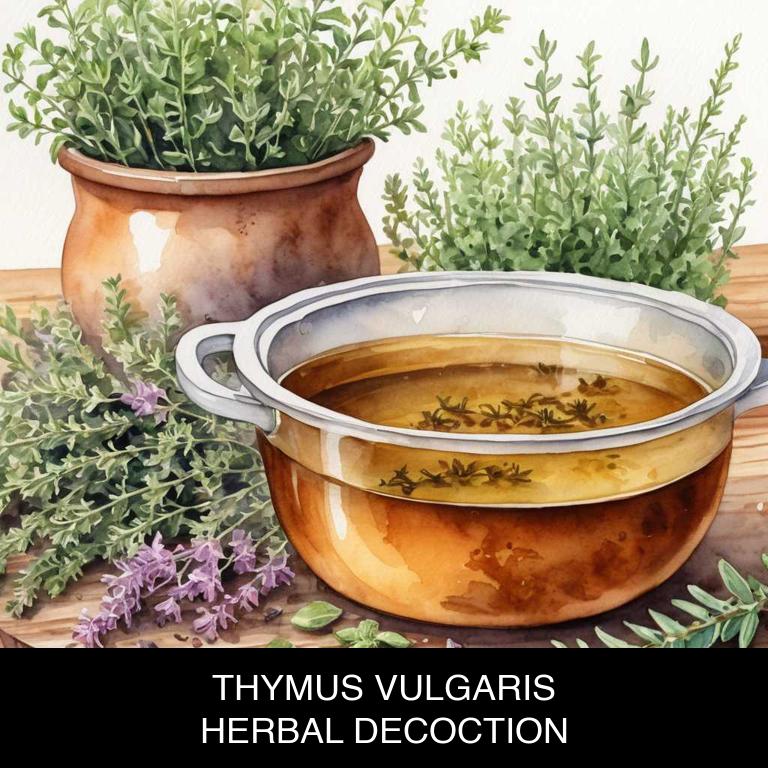
Medicinal Constituents
The list below shows the primary medicinal constituents in Thymus vulgaris decoctions that help with cough.
- Thymol: Thymol, a phenolic compound, acts as an expectorant, helping to loosen and clear mucus from the airways, making it easier to cough up.
- Carvacrol: Carvacrol, a monoterpenic phenol, exhibits expectorant properties, helping to relieve congestion and make coughing more productive.
- Bornyl acetate: Bornyl acetate, a sesquiterpenic compound, has anti-inflammatory and bronchodilatory effects, which can help alleviate cough symptoms by reducing inflammation and opening up airways.
Parts Used
The list below shows the primary parts of thyme used to make decoctions for cough.
- Leaves: Used for decoctions due to their high concentration of thymol, a compound with expectorant and anti-inflammatory properties that help relieve cough.
- Flowers: Used for decoctions to take advantage of their antiseptic and anti-inflammatory properties, which help soothe and calm the throat during cough.
- Buds: Used for decoctions because they contain a higher concentration of essential oils than mature leaves, providing a strong expectorant and anti-inflammatory effect.
Quick Recipe
The following recipe gives a procedure to make a basic thyme for cough.
- Gather 20 grams of dried thymus vulgaris leaves and flowers for decoction preparation.
- Combine the dried thymus vulgaris with 1 liter of boiling water in a heat-resistant container.
- Allow the mixture to steep for 10 to 15 minutes to release the herbal properties.
- Strain the liquid through a cheesecloth or a fine-mesh sieve to remove the solids.
- Store the final decoction in the refrigerator for up to 24 hours before consumption.
6. Mentha x piperita
Peppermint decoctions helps with cough because of its natural soothing properties that ease congestion and inflammation in the chest and throat.
The menthol content in peppermint acts as a natural expectorant, helping to loosen and clear out mucus and phlegm, making it easier to breathe and reducing the severity of coughing fits.
Additionally, peppermint's cooling sensation can help numb the throat, providing relief from itchiness and discomfort associated with coughing.
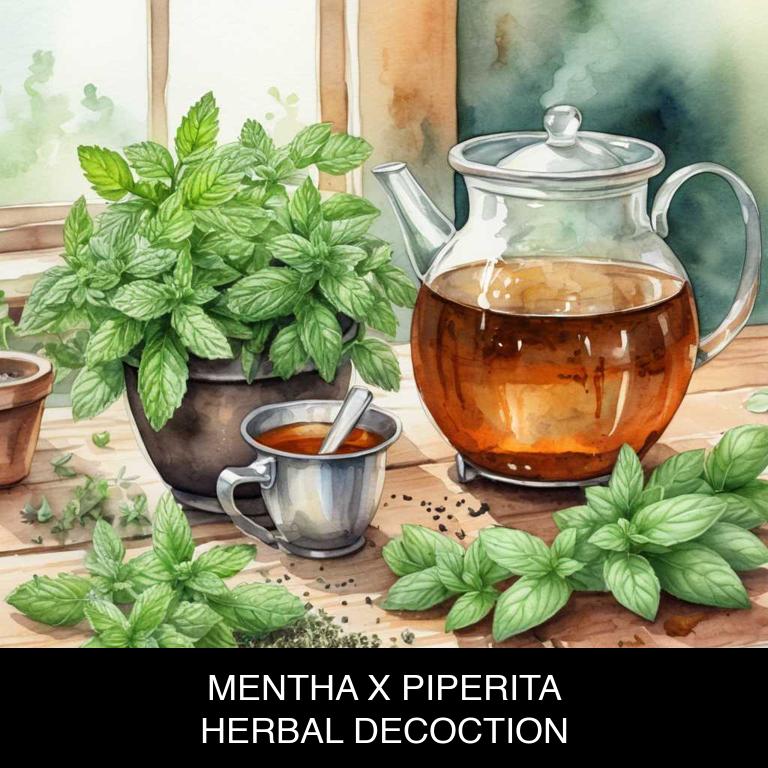
Medicinal Constituents
The list below shows the primary medicinal constituents in Mentha x piperita decoctions that help with cough.
- Menthol: Menthol is a terpene that helps with cough by creating a cooling sensation in the throat, reducing inflammation and providing temporary relief from coughing.
- Rosmarinic acid: Rosmarinic acid is a phenolic compound that helps with cough by reducing inflammation and exhibiting antimicrobial properties, which can help combat underlying infections that cause coughing.
- Cineole: Cineole is a terpene that helps with cough by acting as an expectorant, helping to loosen and clear mucus from the airways, making it easier to breathe and cough.
Parts Used
The list below shows the primary parts of peppermint used to make decoctions for cough.
- Leaves: Leaves are the most commonly used part due to their high concentration of essential oils, which have anti-inflammatory and expectorant properties that help relieve cough and congestion.
- Roots: Roots of Mentha x piperita are used to make decoctions for cough because they contain a higher concentration of menthol, which helps to loosen and clear mucus from the respiratory tract.
- Stems: Stems of Mentha x piperita are used to make decoctions for cough due to their high water content and ability to help thin out mucus, making it easier to expel.
Quick Recipe
The following recipe gives a procedure to make a basic peppermint for cough.
- Harvest 20-30 grams of fresh leaves from the mentha x piperita plant at dawn.
- Chop the harvested leaves into small pieces to release their essential oils and flavor.
- Combine the chopped leaves with 1 liter of boiling water in a heat-resistant container.
- Steep the mixture for 10-15 minutes to allow the herbal constituents to infuse into water.
- Strain the decoction through a cheesecloth or a fine-mesh sieve into a clean container.
7. Foeniculum vulgare
Fennel decoctions helps with cough because of its expectorant properties, which help loosen and clear mucus from the lungs and airways.
The herb's volatile oils, such as anethole and fenchone, have natural anti-inflammatory effects that soothe irritated mucous membranes and reduce inflammation in the respiratory tract.
Additionally, fennel decoctions can help to thin and expel phlegm, providing relief from coughing fits and congestion, making it a natural remedy for alleviating symptoms of bronchitis, asthma, and other respiratory conditions.
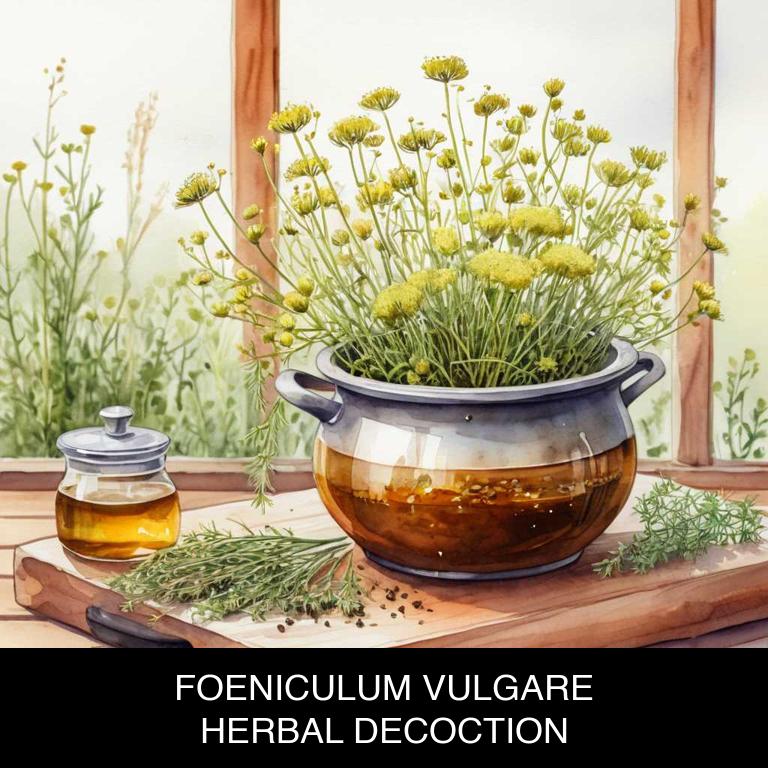
Medicinal Constituents
The list below shows the primary medicinal constituents in Foeniculum vulgare decoctions that help with cough.
- Anethole: Anethole acts as an expectorant, helping to loosen and clear mucus from the airways, thereby relieving cough.
- Foeniculin: Foeniculin has anti-inflammatory properties, which can help reduce inflammation in the throat and airways, thereby alleviating cough and making breathing easier.
- Phenolic compounds: Phenolic compounds have antioxidant and anti-inflammatory effects, which can help soothe the throat, reduce inflammation, and protect against oxidative stress, ultimately easing cough symptoms.
Parts Used
The list below shows the primary parts of fennel used to make decoctions for cough.
- Seeds: Known for their carminative and expectorant properties, helping to relieve cough and congestion.
- Leaves: Used for their antispasmodic and expectorant properties, easing cough and soothing the respiratory system.
- Stems: Utilized for their antispasmodic and anti-inflammatory properties, providing relief from cough and soothing irritated tissues.
Quick Recipe
The following recipe gives a procedure to make a basic fennel for cough.
- Gather fresh foeniculum vulgare leaves and stems and clean them thoroughly with cold water.
- Chop 2-3 teaspoons of the clean foeniculum vulgare into small pieces for a decoction.
- Combine the chopped foeniculum vulgare with 1 cup of boiling water in a heat-resistant cup.
- Steep the mixture for 5-7 minutes to allow the active compounds to infuse into the water.
- Strain the decoction through a cheesecloth or a fine-mesh sieve into a separate container.
8. Trichosanthes kirilowii
Chinese snakegourd decoctions helps with cough because its unique blend of active compounds, such as flavonoids, terpenes, and alkaloids, possesses natural expectorant properties.
These compounds help to loosen and clear mucus from the lungs and airways, reducing congestion and relieving cough symptoms. Additionally, snakegourd's anti-inflammatory properties may help soothe irritated respiratory tissues and reduce inflammation in the throat, further alleviating cough discomfort.
As a result, Chinese snakegourd decoctions have been traditionally used to treat a range of respiratory issues, including chronic bronchitis, asthma, and upper respiratory tract infections.
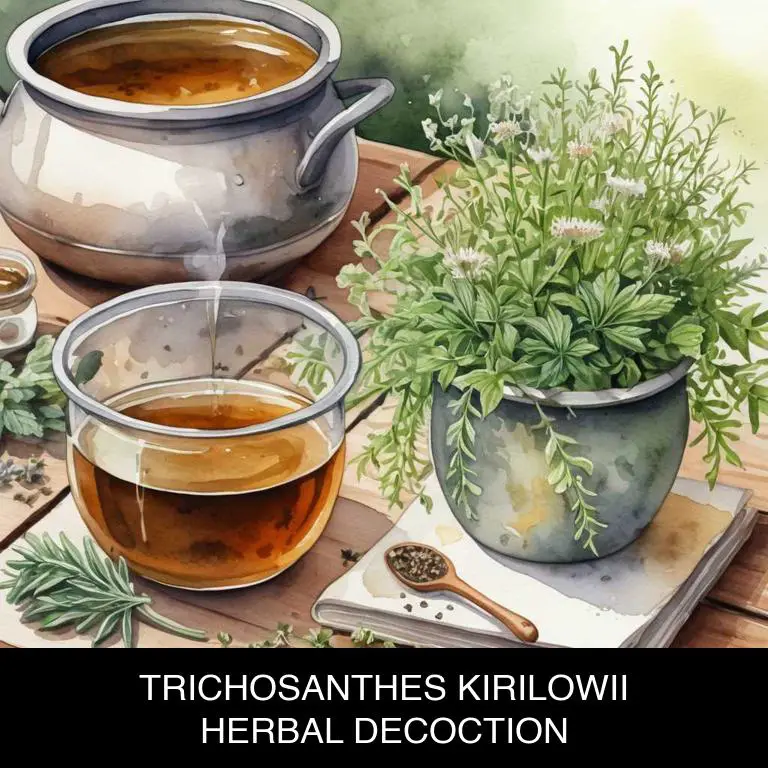
Medicinal Constituents
The list below shows the primary medicinal constituents in Trichosanthes kirilowii decoctions that help with cough.
- Saponins: Saponins in Trichosanthes kirilowii decoctions help reduce inflammation and irritation in the throat, thereby alleviating cough symptoms.
- Flavonoids: Flavonoids have anti-inflammatory and antioxidant properties that help soothe the irritated mucous membranes in the throat, reducing coughing.
- Triterpenoids: Triterpenoids exhibit expectorant properties, which help loosen and clear mucus from the airways, making it easier to cough up and relieving congestion.
Parts Used
The list below shows the primary parts of chinese snakegourd used to make decoctions for cough.
- Roots: Roots are used to make decoctions for cough due to their potential anti-inflammatory and expectorant properties.
- Rhyzomes: Rhyzomes are used to make decoctions for cough due to their potential to reduce inflammation and alleviate congestion.
- Stems: Stems are used to make decoctions for cough due to their potential anti-inflammatory and antimicrobial properties.
Quick Recipe
The following recipe gives a procedure to make a basic chinese snakegourd for cough.
- Gather 30-60 grams of dried root of trichosanthes kirilowii and rinse it under running water.
- Cut the dried root into small pieces and soak it in 1 liter of water for 2 hours.
- Bring the water to a boil then reduce the heat to a simmer and let it cook for 30-40 minutes.
- Strain the decoction through a cheesecloth or a fine-mesh sieve into a clean container.
- Store the decoction in the refrigerator and consume 20-30 milliliters 2-3 times a day.
9. Scutellaria lateriflora
Skullcap decoctions helps with cough because it contains flavonoids and phenolic acids that have anti-inflammatory properties, which help to reduce congestion in the chest and throat.
The decoction also contains volatile oils that soothe the respiratory tract, calming a persistent cough and relieving irritation.
Additionally, skullcap has natural expectorant properties, helping to loosen mucus and ease its elimination from the body, providing relief from stubborn coughs and clearing the airways for easier breathing.
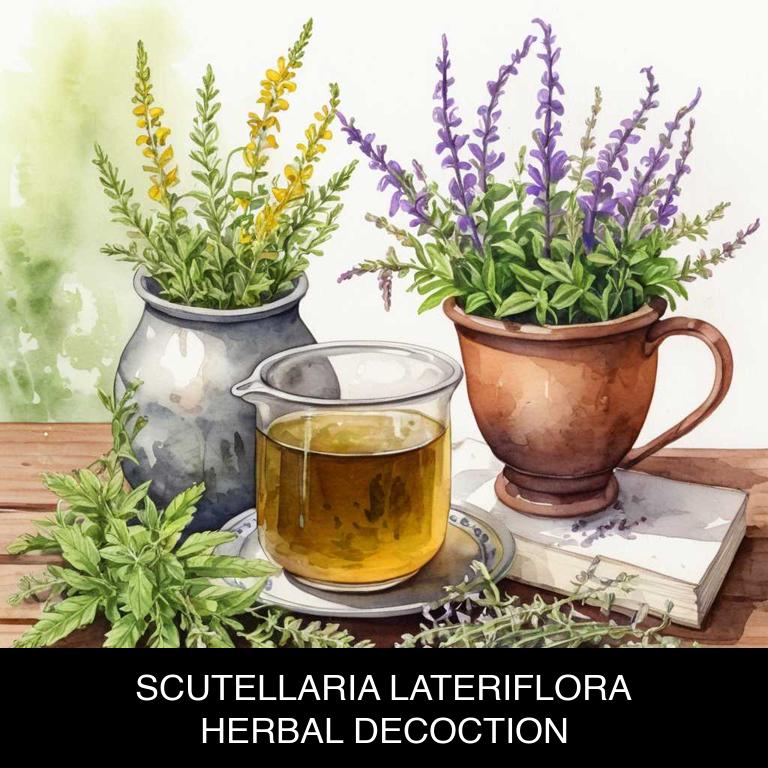
Medicinal Constituents
The list below shows the primary medicinal constituents in Scutellaria lateriflora decoctions that help with cough.
- Baicalein: Baicalein is a flavonoid that helps with cough by exhibiting anti-inflammatory and antispasmodic properties, which can reduce inflammation and calm the airway muscles.
- Baicalin: Baicalin is a flavonoid glycoside that helps with cough by possessing anti-inflammatory and expectorant properties, which can reduce inflammation and facilitate the removal of mucus from the respiratory tract.
- Scutellarein: Scutellarein is a flavonoid that helps with cough by displaying antispasmodic and anti-inflammatory properties, which can relax the airway muscles and reduce inflammation in the respiratory tract.
Parts Used
The list below shows the primary parts of skullcap used to make decoctions for cough.
- Leaves: Used for their anti-inflammatory and expectorant properties to help relieve cough and congestion.
- Roots: Utilized for their bitter compounds, which can help stimulate digestion and relieve cough associated with digestive issues.
- Flowers: Employed for their soothing and anti-inflammatory effects to calm the respiratory tract and reduce cough.
Quick Recipe
The following recipe gives a procedure to make a basic skullcap for cough.
- Harvest scutellaria lateriflora roots and clean them thoroughly to remove any dirt or debris.
- Dry the cleaned roots for 2 weeks in a warm well-ventilated area to reduce moisture content.
- Crush 2-4 grams of dried scutellaria lateriflora roots into a fine powder using a mortar and pestle.
- Boil 200 milliliters of water in a saucepan for 5 minutes to create a hot liquid base.
- Combine the powdered scutellaria lateriflora with the boiling water and let it steep for 10-15 minutes.
10. Verbascum thapsus
Mullein decoctions helps with cough because of its potent expectorant properties, which loosen and clear out mucus from the respiratory tract.
The plant's leaves contain saponins and flavonoids that soothe and calm irritated airways, reducing inflammation and congestion.
By thinning and removing excess mucus, mullein decoctions help to ease coughing fits and make breathing easier, providing relief from persistent coughs caused by colds, allergies, and other respiratory issues.
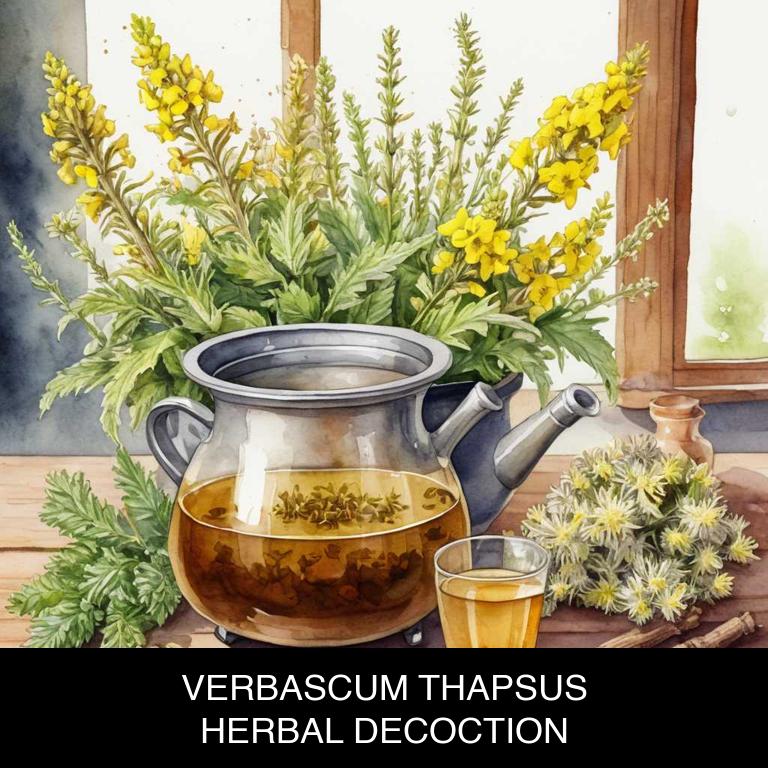
Medicinal Constituents
The list below shows the primary medicinal constituents in Verbascum thapsus decoctions that help with cough.
- Alkaloids: Verbascum thapsus contains verbascoside, a type of alkaloid that helps soothe and calm the respiratory tract, thereby reducing cough.
- Saponins: Saponins present in Verbascum thapsus have anti-inflammatory properties that help reduce inflammation in the airways, which can contribute to cough relief.
- Flavonoids: Flavonoids such as quercetin in Verbascum thapsus have antioxidant and anti-inflammatory properties that help protect the lungs and airways from damage, reducing cough and other respiratory symptoms.
Parts Used
The list below shows the primary parts of mullein used to make decoctions for cough.
- Leaves: The leaves are used to make decoctions for cough because they contain mucilage, which helps to soothe and calm the irritated respiratory tract.
- Roots: The roots are used to make decoctions for cough because they contain saponins, which have anti-inflammatory properties that help to reduce inflammation in the throat and airways.
- Stems: The stems are used to make decoctions for cough because they contain a similar mixture of mucilage and saponins, which help to calm and soothe the respiratory tract.
Quick Recipe
The following recipe gives a procedure to make a basic mullein for cough.
- Harvest 1-2 bunches of fresh verbascum thapsus flowers and leaves for a decoction preparation.
- Rinse the harvested verbascum thapsus flowers and leaves thoroughly with cold water to remove impurities.
- Combine 20-30 grams of the fresh verbascum thapsus plant material in a large pot with 2 liters of water.
- Boil the water and plant material for 5-10 minutes to release the active ingredients slowly.
- Strain the decoction and discard the solids after 10-15 minutes of cooling to obtain a clear liquid.
What is the best combination of herbal decoctions to use for cough?
The best combination of herbal decoctions that help with cough is a blend of ginger, licorice root, and thyme.
Ginger helps reduce inflammation and soothe the throat, while licorice root provides anti-inflammatory properties and eases coughing. Thyme, rich in antibacterial properties, fights off infections that cause cough. Mix 1 teaspoon of dried ginger, 1 teaspoon of dried licorice root, and 1 teaspoon of dried thyme in a cup of boiling water.
Strain and drink 2-3 times a day to alleviate cough symptoms naturally.
What ailments similar to cough are treated with herbal decoctions?
Ailments similar to cough/decoctions.html">cough/decoctions.html">cough that are treated with herbal decoctions are sore throat, bronchitis, and colds.
Herbal decoctions such as thyme, ginger, and licorice root help soothe a sore throat, while those containing eucalyptus, peppermint, and lemon balm relieve congestion in the chest associated with bronchitis and colds.
These natural remedies provide relief from discomfort, inflammation, and respiratory issues without harsh chemicals or side effects.